Last Updated: 2011.02.07
to Japanese page
Developing products of exceptionally high quality
To ensure the development of products of exceptional quality, UNIQLO has refined its SPA* (Specialty store retailer of Private label Apparel) business model, allowing for control of the entire business process — from planning and design to material procurement and sales.
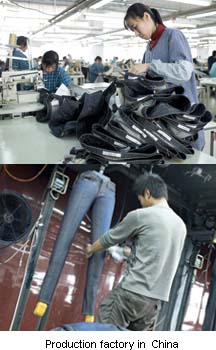 UNIQLO is continuously developing products of exceptional quality, in order to “create clothing with new and unique value and to satisfy customers worldwide.”
UNIQLO is continuously developing products of exceptional quality, in order to “create clothing with new and unique value and to satisfy customers worldwide.”
 Product development based on customer feedback
Product development based on customer feedback
Customer opinions and needs play a vital role in UNIQLO’s product development. The UNIQLO Customer Center receives approximately 70,000 comments from customers annually. Our HEATTECH products, for example, have been refined each year based on customer feedback — such as comments asking for softer fabric, a function to keep skin both warm and prevent dryness and an expanded range of colors. It is precisely this customer feedback that makes it possible for UNIQLO to produce the high-quality apparel that it does.
 Material procurement from around the world
Material procurement from around the world
The UNIQLO Material Development Team is able to procure high-quality materials at low costs through direct negotiations with and bulk purchases from material manufacturers globally. For instance, take the denim fabric that is nearly synonymous with UNIQLO. This is woven, dyed and manufactured to meet UNIQLO’s specifications by the global denim manufacturer KAIHARA Co., Ltd.. In addition, it is efforts like this that have made it possible for UNIQLO to secure high-quality, long-staple cotton — which can only be harvested from three percent of the world’s cotton plants — for UNIQLO’s popular Extra-Fine Cotton plain T-Shirts.
 Expert technical guidance at factories emphasizes quality
Expert technical guidance at factories emphasizes quality
In order to produce millions of products of standardized quality, it becomes important to implement quality control across factory production technology and management. UNIQLO has a team of technical specialists, known as the Takumi Team, boasting many years of experience in the Japanese textile industry. These specialists are sent directly to our partner factories in China to offer technical instruction and share their abundant experience. At the same time, the supervisors from the Production Department, based in the Shanghai office, make weekly visits to partner factories to check the quality and progress of production.
* SPA stands for “Specialty store retailer of Private label Apparel,” meaning that the company’s activities are fully integrated from manufacturing through sales, including material procurement, design, product development, production, distribution, inventory management and final sales.
Expanding the women’s line of apparel
Market for Women's Wear Twice that of Men's
Japan' s total apparel market is estimated to be worth 10.7 trillion yen.* Of that, the women's wear market is worth 7.1 trillion yen, men's wear accounts for 2.9 trillion yen and children's clothing 0.7 trillion yen. The women's wear market in Japan is therefore more than double the size of the market for men's clothing.
Starting as a casual wear shop for men, UNIQLO's strength in men's wear has helped it to achieve an 8.7% share of the 10.7-trillion-yen marker. But UNIQLO's share of the women's wear market is a mere 4.1%. In light of these figures, it is clear that developing more women's products holds the key to future growth.
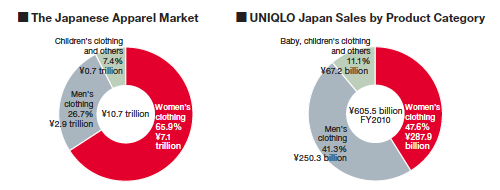
* The Japanese apparel market was calculated at 10.7 trillion yen based on the Ministry of Economy, Trade and Industry's 2007 commerce statistics survey, covering department stores, supermarkets and clothing retailers. These figures do not include Japanese kimono and sleepwear, or accessories such as footwear and bags.
Basic clothes are a core strength of UNIQLO, and no wardrobe is complete without them. UNIQLO believes that it can firmly capture the hearts and minds of women with clothes that offer the triple benefits of price, quality and style. UNIQLO aims to win female customers of all ages by offering a reasonably priced, quality-finish garment range so attractive that no other competing brand can match it.
Global flagship stores
Flagship Stores Boosts the Brand
In order to become a leading world brand, UNIQLO must first become the dominant, number-one player in Asian markets. Since entering the Chinese market in 2002, UNIQLO has expanded its Asian store network to cover Hong Kong, South Korea, Singapore, Taiwan and Malaysia. UNIQLO International already generates approximately 70% of its total sales in Asia.
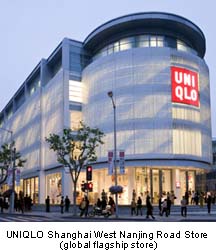 The reason why other competing brands such as H&M and Zara grew so rapidly over the past ten years is because they looked beyond their domestic borders and expanded into international markets. We are also looking to generate similar growth by opening stores across the globe. At the end of fiscal 2010, UNIQLO's global store network had grown to 136 stores, which generate only 10.7% of total UNIQLO sales. Our current aim is to have UNIQLO International sales surpass total UNIQLO Japan sales.
The reason why other competing brands such as H&M and Zara grew so rapidly over the past ten years is because they looked beyond their domestic borders and expanded into international markets. We are also looking to generate similar growth by opening stores across the globe. At the end of fiscal 2010, UNIQLO's global store network had grown to 136 stores, which generate only 10.7% of total UNIQLO sales. Our current aim is to have UNIQLO International sales surpass total UNIQLO Japan sales.
UNIQLO is seeking to build its brand through its network of global flagship stores. Global flagship stores serve as hubs to get out the UNIQLO message, and concept of high-quality basics, while showcasing what sets UNIQLO apart from competitors such as H&M, Zara or Gap. The first global flagship store opened in New York's Soho area in fall 2006. Since then, global flagship stores have opened in London, Paris, Shanghai, and Osaka's Shinsaibashi. Preparations are now underway to open another global flagship store on New York's Fifth Avenue in fall 2011.
UNIQLO Japan: Accelerate large-format store openings in urban areas
A Large-scale Store Business Model
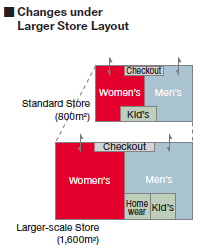 In the apparel industry, typically sales and profitability per square meter decrease as sales floor area rises. However, by boosting sales and reducing costs with a richer mix of products, particularly for women, UNIQLO has established a profitable business model for large-scale stores.
In the apparel industry, typically sales and profitability per square meter decrease as sales floor area rises. However, by boosting sales and reducing costs with a richer mix of products, particularly for women, UNIQLO has established a profitable business model for large-scale stores.
Through fiscal 2010, UNIQLO expanded to 102 its network of large-scale stores, accounting for about 20% of UNIQLO Japan sales. The company is expanding its sales-floor space by concentrating on new large-scale store openings, and scrapping mid-scale stores that may cannibalize demand in new store areas.
Expand Market Share with Urban Stores
UNIQLO has a 5.5% share of Japan's domestic apparel market. To continue to grow, in addition to boosting sales of women's wear, UNIQLO is focused on increasing its share of the urban apparel market.
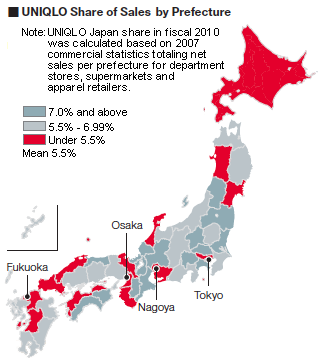 UNIQLO store operations have been disproportionately located outside of the populated major urban areas of Japan, namely Tokyo, Osaka, Nagoya and Fukuoka.Since 2009, UNIQLO has been opening more new stores in urban-high-street locations and in department stores. This is a win-win proposition for UNIQLO and the owners of these spaces. The rising profile of UNIQLO and its ability to attract customers appeals to owners of these locations, such as department stores and developers.
UNIQLO store operations have been disproportionately located outside of the populated major urban areas of Japan, namely Tokyo, Osaka, Nagoya and Fukuoka.Since 2009, UNIQLO has been opening more new stores in urban-high-street locations and in department stores. This is a win-win proposition for UNIQLO and the owners of these spaces. The rising profile of UNIQLO and its ability to attract customers appeals to owners of these locations, such as department stores and developers.
These prime-location stores are popular with customers and generate strong sales. The stores hold great potential for UNIQLO, both in attracting a broader range of customers as well as further boosting brand value.
UNIQLO International: Profitability on the Rise
UNIQLO's overseas business is forecast to achieve net sales of 100 billion yen and operating income of 8.5 billion yen at UNIQLO International for the fiscal year ending August 2011. Sales from overseas operations account for more than 10% of all UNIQLO sales, with both sales and profitability expanding steadily in Asia, which accounts for over 70% of overseas sales, or approximately 70 billion yen.
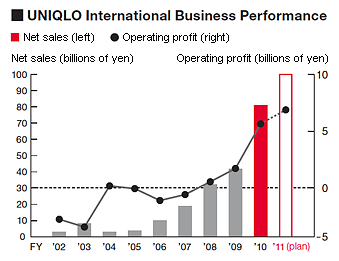 In China, UNIQLO's brand presence has increased dramatically as we have focused on establishing stores in urban settings, including launching a full-scale expansion in Beijing following the opening of stores in Shanghai. The opening of the global flagship store, the Shanghai West Nanjing Road Store, in May 2010 has proved an immense success and is expected to help spur UNIQLO's expansion in the Chinese market.
In China, UNIQLO's brand presence has increased dramatically as we have focused on establishing stores in urban settings, including launching a full-scale expansion in Beijing following the opening of stores in Shanghai. The opening of the global flagship store, the Shanghai West Nanjing Road Store, in May 2010 has proved an immense success and is expected to help spur UNIQLO's expansion in the Chinese market.
Stores in Hong Kong have achieved an exceptionally high operating efficiency, and sales per store are high. Customers have enthusiastically embraced the +J collection and revenue continues to grow.
In South Korea, UNIQLO has formed a joint venture with Lotte Shopping Co., Ltd. the nation's largest retailing enterprise. It has since opened locations in Lotte department stores and Lotte Marts, as well as launching a large-format store in the Myeongdong district of Seoul as the venture steadily expands its network of stores.
The first UNIQLO Singapore store opened in 2009 and has proved immensely successful.
Also, in Southeast Asia, UNIQLO opened its first Malaysia store in Kuala Lumpur in November 2010 and plan to launch our first Thailand store in the fall of 2011.
In October 2010, we opened our first Taiwan store in Taipei. Located in a major department store, the store has been extremely well received.
Our operations in Russia continue to expand steadily. After opening our first Russia store in April 2010, we launched our second store in the market in November 2010 with the store network set to expand steadily.
In the United Kingdom, an increase in sales per store spurred a significant improvement in profitability, while our 311 Oxford Street global flagship store continued to record robust sales.
In the United States, our Soho New York global flagship store is performing extremely well. Despite opening its doors in November 2006, the store has continued to record impressive results recording year-on-year sales growth of approximately 40% in fiscal 2010. These results demonstrate the strong support that UNIQLO's high-quality basic products are finding in the market. In the fall of 2011, our second U.S. global flagship store is to open on the New York's Fifth Avenue.
The Paris global flagship store opened in October 2009, and even after a few months, the lines of customers continued to persist. News of the hugely successful Paris store has spread around the world, contributing significantly to the heightened brand recognition that UNIQLO has enjoyed.
HEATTECH
HEATTECH is the result of collaboration between UNIQLO and Toray Industries, Inc. HEATTECH is a unique highly functional line of innerwear that offers amazing comfort, which has won over a multitude of customers.
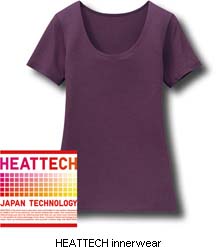 We developed HEATTECH in response to customers’ demands for functional innerwear to complement UNIQLO’s previous lineup of mostly cotton innerwear. Our debut HEATTECH product line was launched in the fall/winter 2004 as warm innerwear for men, combining the merits of heat-retention and anti-perspiration functions. The following year we began selling similar products for women. By combining our original HEATTECH fibers with a special milk protein, we were able to create a fabric that is smooth, soft and comfortable. The products proved so popular in the 2007 fall/winter season that production was nearly outpaced by demand.
We developed HEATTECH in response to customers’ demands for functional innerwear to complement UNIQLO’s previous lineup of mostly cotton innerwear. Our debut HEATTECH product line was launched in the fall/winter 2004 as warm innerwear for men, combining the merits of heat-retention and anti-perspiration functions. The following year we began selling similar products for women. By combining our original HEATTECH fibers with a special milk protein, we were able to create a fabric that is smooth, soft and comfortable. The products proved so popular in the 2007 fall/winter season that production was nearly outpaced by demand.
UNIQLO relentlessly strives to create world-class products of the highest caliber and will not compromise on quality. One example of this commitment to quality is the strategic partnership formed with Toray in June 2006. Toray had the technology and manufacturing capability to meet UNIQLO’s high quality standards, and together we pushed the boundaries of technology to create the fiber LOC Ⅱ “CEO![]() ” ®, the foundation for HEATTECH. This synthetic fiber is soft yet durable, and can be created in a wide range of vibrant colors. HEATTECH’s superior functionality lies in this highly advanced original fiber. To meet the high demand for HEATTECH, we have increased the production capacity of Toray’s Ishikawa Plant with an exclusive HEATTECH production line.
” ®, the foundation for HEATTECH. This synthetic fiber is soft yet durable, and can be created in a wide range of vibrant colors. HEATTECH’s superior functionality lies in this highly advanced original fiber. To meet the high demand for HEATTECH, we have increased the production capacity of Toray’s Ishikawa Plant with an exclusive HEATTECH production line.
The hallmark qualities of HEATTECH are its thinness, lightness and softness, and the comfort achieved by the elasticity of the fabric is so outstanding that it has continued to both greatly impress and satisfy our customers. In the 2010 fall/winter season, 80 million HEATTECH items were sold worldwide, spanning the entire lineup from innerwear and socks to bodywarmers and jeans.